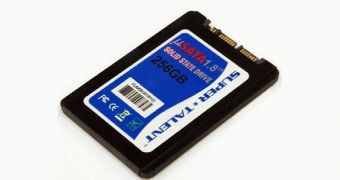Solid state drives are better survivors than hard disk drives just by virtue of having no moving parts, but there are ways to make them a lot tougher still, and Super Talent has just used some of them on the MasterDrive.
MasterDrive KX3 is the name of the newest solid state drive to leave Super Talent's labs and is an industrial model that is better capable of handling extreme temperatures than other SSDs.
Normal SSDs can work at around 0° C to 70° C/ 32° F to 158° F or so. The new one from Super Talent, however, can cope with -40° C to 85° C / -40° F to 185° F. The company says this is owed to “carefully selected thermal range components.”
Technically speaking, all solid state drives can survive under those extreme heats and colds, but only if they are unused. Stored somewhere. That is the storage temperature as it were. The new Super Talent MasterDrive KX3, however, can also operate safely.
Given that, it is rather unfortunate that the performance isn't all that high, owing to the use of the uSATA Interface, which limits throughput to about half of what SATA 6.0 Gbps would permit.
Thus, the sequential read speed cannot go above 250 MB/s, while writing is achieved at 130 MB/s. Also, capacities are quite modest as well, ranging from 32 GB to 256 GB. The cache is of 128 MB.
On the bright side, the Super Talent MasterDrive KX3 is quite small, compact. It features the 1.8-inch form factor, rather than the 2.5-inch size that SSDs prefer.
The new SSDs are meant to “solve the problem of physical space constraints in a computing system,” which we can take to mean that it would do well in a home-theater personal computer or even a media player (assuming it has a uSATA / microSATA port).
Considering the industrial endurance though, a safer bet is that the target are portable rugged laptops and desktops taken into unfriendly areas. Workstations like those may have lots of protection layers, but heat and cold can’t be denied forever, and while an 1.8-inch HDD could be damaged if the laptop is dropped, SSDs don't have that vulnerability.
Sadly, despite posting a complete product page, SanDisk does not say what price the MasterDrive KX3 sells under, or will sell under whenever shipments begin. It could possibly be owed to the likelihood that the newcomer won't sell standalone at all, but only as part of pre-configured mobile PCs/workstations and industrial systems.

 14 DAY TRIAL //
14 DAY TRIAL //